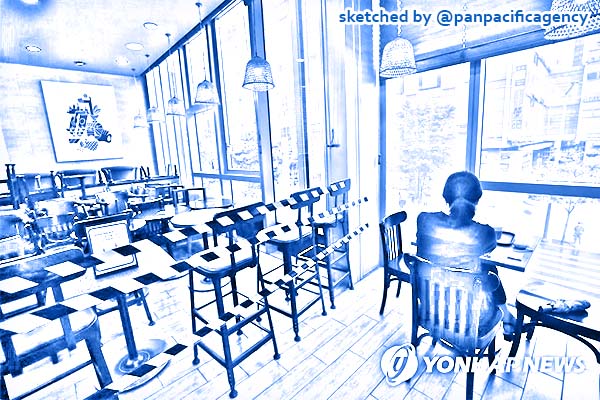North Korea moves to retool and bolster its disease-control systems

This file photo shows tables and chairs that are not being used to keep social distancing at a cafe in Seoul. (Yonhap). Sketched by the Pan Pacific Agency.
SEOUL, Feb 8, 2022, Daily NK. North Korea is apparently retooling and bolstering its quarantine system this year as the country’s authorities promote “advanced, people-friendly” quarantine efforts amid the continuing COVID-19 pandemic, Daily NK reported.
According to Daily NK sources in North Pyongan Province and Gangwon Province, North Korea recently created an organization under the direct command of the Central Emergency Anti-epidemic Headquarters to serve at quarantine checkpoints along provincial, city, and county boundaries.
In the past, quarantine officials from local quarantine stations would go around to temporarily man checkpoints. Now, however, eight to ten “quarantine enforcers” under the Central Emergency Anti-epidemic Headquarters will serve at each checkpoint in four shifts, bolstering the responsibility these checkpoints have.
North Korea is also mandating that private buses and delivery vehicles that ply between provinces, cities, and counties carry at least one person devoted to “disease control and sanitization.” If they fail to do so, they will be busted at checkpoints for violating quarantine laws.
The sources said quarantine and sanitization personnel on the vehicles must wear protective clothing and have a disinfectant sprayer and disinfectant. If there is a driver and a conductor, the conductor usually serves as the quarantine person; if that is not the case, vehicle owners or drivers must find somebody who will, even if that means hiring an additional person.
Additionally, the sources said the Ministry of State Security’s “No. 10 checkpoints” around Pyongyang and the quarantine checkpoints are “watching each other” this year. If a checkpoint takes a bribe to let a vehicle or individual pass that should not, it will get reported up the chain of command.
North Korea has also made the process of getting travel certificates tougher, even as the authorities enable travel within the country with the exception of Pyongyang, the China-North Korea border region, and the region along the DMZ.
When a traveler arrives at their destination, they must go to a clinic and receive a stamp that says he or she is free of symptoms after talking with a doctor. They must get a stamp at a clinic when they leave the destination, too.
The sources said that if the trip lasts more than a week, the traveler must receive a stamp from a clinic every three days after the passage of a week.
According to the sources, the authorities have accumulated experience managing public health over the last two years of “emergency quarantine efforts” and are using this know-how to change their administrative procedures and systems.
At the conclusion of the Fourth Plenary Meeting of the Eighth Central Committee last year, North Korea once again named “emergency quarantine efforts” the “top national project,” calling on North Koreans to vigorously carry out those efforts free from the slightest laxity, holes, or mistakes. At the same time, the leadership called for aggressive efforts to bolster the means and capacities needed to shift to more advanced, people-friendly quarantine efforts.
Above all, North Korea has been calling on officials to ensure “public convenience” in quarantine efforts, but locals are complaining that the strengthened quarantine system is a hassle.
The sources said North Koreans can now travel if “they set their mind to it,” but many people are despairing because the system is too complex.
One source noted that people are saying the system is so full of red tape that getting a travel certificate is extremely difficult.